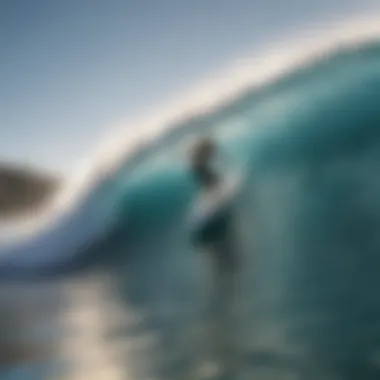Ultimate Guide to Choosing Your First Surfboard for Beginners


Water Activity Overview
In the realm of water activities, few offer the thrill and connection to nature quite like surfing. A sport gracefully blending athleticism and artistry, surfing has captivated enthusiasts worldwide. With its roots tracing back to Polynesian culture, modern surfing has become a global phenomenon, attracting individuals seeking a harmonious dance with the waves. Sailing, on the other hand, embodies a more tranquil experience on the water, harnessing the power of the wind to navigate vast expanses. Snorkeling delves beneath the water's surface, unveiling a vibrant underwater world teeming with colorful reefs and diverse marine life. For those seeking a core workout intertwined with relaxation, paddleboarding presents a compelling option, offering a serene glide across calm waters.
Tips and Techniques
Navigating the waves as a beginner surfer can be both exhilarating and daunting. To embark on this journey successfully, beginners should focus on mastering fundamental techniques such as paddling efficiently, popping up smoothly, and maintaining balance on the board. As beginners progress, learning to read and anticipate waves becomes instrumental in advancing their skills. For the seasoned surfing enthusiast, exploring advanced techniques like bottom turns, cutbacks, and barrel riding can elevate their surfing prowess to new heights. Safety should always remain a top priority, with surfers adhering to surf etiquette, being mindful of fellow surfers, and respecting the power of the ocean.
Gear Reviews
Surfboards serve as the quintessential tool for surfers, with a myriad of shapes and designs tailored to different skill levels and wave conditions. Choosing the right surfboard involves considering factors such as volume, shape, and rocker to match the surfer's abilities and the intended wave type. Sailboats, with their billowing sails and graceful hulls, enable sailors to harness the wind's power for navigation and leisure. Snorkeling enthusiasts rely on specialized equipment like masks, snorkels, and fins to explore the underwater realm comfortably and safely. Paddleboards come in various sizes and constructions, offering stability and maneuverability for paddlers of all skill levels. Wetsuits play a crucial role in keeping water sports enthusiasts warm and protected from the elements, extending their time in the water.
Destination Guides
From iconic surf breaks to sun-kissed beaches, popular water sports locations beckon enthusiasts with their promise of adventure and excitement. Hidden gems in secluded coves and pristine lagoons offer a more tranquil water experience, away from the crowds. Traveling to these destinations requires careful planning, from packing essential gear to researching local weather patterns and water conditions. While seeking these aquatic adventures, enthusiasts can benefit from local insights, ensuring a memorable and safe water sports trip.
Introduction
Understanding Surfboards
Anatomy of a Surfboard
Embarking on a journey to grasp the anatomy of a surfboard is akin to unraveling the secrets of a finely crafted instrument. Each component, from the deck to the rail, plays a pivotal role in the board's performance on the water. The curvature of the nose, the thickness of the tail, and the placement of fins all contribute to stability, maneuverability, and speed. Understanding these intricacies allows surfers to optimize their riding experience, ensuring that their board aligns seamlessly with their skill level and objectives. While mastering the anatomy may seem daunting at first, delving into these details enriches the surfing journey, offering a profound appreciation for the synergy between rider and board.


Materials Used in Surfboard Construction
The materials utilized in surfboard construction stand as a testament to innovation and functionality in the surfing realm. From traditional polyurethane foam to cutting-edge carbon fiber composites, each material brings its unique blend of characteristics to the finished product. Whether it be the buoyancy of EPS foam or the durability of fiberglass, surfboard materials are carefully chosen to withstand the rigors of wave riding while providing optimal performance. Exploring the rationale behind these material choices unveils a world where craftsmanship meets science, where the quest for the perfect wave is paralleled by the pursuit of the perfect board.
Types of Surfboards
Shortboards
Shortboards, the epitome of high-performance surfing, cater to riders seeking precision, speed, and maneuverability. Their compact size and narrow profile enable quick turns and explosive maneuvers on the face of the wave. A favorite among experienced surfers, shortboards command respect in hollow barrels and steep faces, offering a dynamic surfing experience characterized by adrenaline-fueled maneuvers and intense wave-riding. However, the learning curve for shortboards can be steep, requiring a certain level of skill and wave knowledge to harness their full potential.
Longboards
In contrast to their shorter counterparts, longboards exude a sense of grace, fluidity, and leisure in the water. Known for their stability and paddle power, longboards are an excellent choice for beginners and those looking to enjoy a more relaxed surfing style. Their increased length provides ample buoyancy, making it easier to catch waves and maintain balance while riding. Longboards foster a nostalgic connection to the roots of surfing, harking back to a time when surfing was synonymous with elegance and serenity.
Fish Boards
Fish boards, with their distinctive swallowtail design and wide outline, bridge the gap between shortboards and longboards, offering a versatile option for varying wave conditions. Their compact size and unique template allow for increased speed, ideal for generating momentum in small to medium-sized waves. Fish boards excel in mushy or lackluster conditions, injecting a sense of excitement and agility into each ride. While their unconventional shape may intimidate some riders, those who embrace the fish board will discover a whole new dimension of surfing performance.
Funboards
Treeboards, the jack-of-all-trades in the surfboard realm, strike a balance between the agility of shortboards and the stability of longboards. Their versatile design caters to a wide range of skill levels and wave types, making them a favorite among surfers seeking flexibility in their riding experience. Funboards offer paddling ease, wave-catching ability, and maneuverability, making them an excellent choice for beginners transitioning from longboards to more performance-oriented boards. While some may view funboards as a compromise between extremes, their adaptability and forgiving nature make them a valuable addition to any surfer's quiver.
Choosing the Right Surfboard


Choosing the right surfboard is a pivotal decision for surfers, especially beginners. The surfboard you select can significantly impact your surfing experience, both positively and negatively. Factors such as volume, width, length, and shape play key roles in ensuring compatibility between the surfer and the board. By understanding your skill level and the wave conditions you plan to surf in, you can make an informed choice on the surfboard that best suits your needs.
Surfer's Skill Level
Surfer's skill level is a fundamental consideration when selecting a surfboard. Determining the right volume of the surfboard is crucial at this stage. Volume refers to the amount of foam within the surfboard, influencing its buoyancy and stability in the water. Beginners often benefit from higher-volume surfboards as they provide better floatation and stability, aiding in mastering the basics of surfing. While advanced surfers may opt for lower-volume boards for greater maneuverability and speed in more challenging conditions.
Wave Conditions
Matching board volume to wave conditions is a critical aspect of optimizing your surfing experience. Different wave conditions call for varying board volumes to ensure maximum performance and enjoyment. In smaller, weaker waves, a higher-volume board can help catch waves more easily and provide stability for practicing maneuvers. Conversely, in larger, more powerful waves, a lower-volume board offers greater control and responsiveness, allowing surfers to navigate critical sections with precision.
Essential Tips for Beginner Surfers
Navigating the exhilarating world of surfing as a novice can be both thrilling and intimidating. This section aims to elucidate essential tips that serve as the bedrock for a fledgling surfer's journey into the waves. Understanding the nuances of paddling, popping up on the board, and maintaining balance is pivotal for enhancing your surfing experience. These fundamental principles not only aid in honing your skill but also ensure safety and enjoyment while riding the majestic waves.
Paddling Techniques
Mastering the art of paddling in surfing is akin to gaining the key to unlock a world of aquatic adventure. Among the integral components of paddling lies proper body positioning, a cornerstone technique for surfers of all levels. Emphasizing the correct alignment of your body while paddling not only optimizes propulsion but also minimizes drag, facilitating smoother navigation through the water. Moreover, maintaining a strong core and engaging key muscle groups is imperative to propel yourself forward efficiently, ensuring you catch those coveted waves with finesse.
Proper Body Positioning
Delving into the crux of paddling, proper body positioning serves as the linchpin for optimal performance on your surfboard. By aligning your body parallel to the board, you decrease water resistance and enhance your paddling speed. This position enables you to exert maximum force with each stroke, propelling you towards the oncoming waves. Embracing proper body positioning not only boosts your momentum but also reduces fatigue, enabling sustained paddling sessions to explore diverse surf breaks.
Pop-Up and Riding Waves


Evolving from mastering paddling, conquering the art of popping up on the board and maintaining balance while riding waves catapults your surfing prowess to new heights. The seamless transition from prone to standing position greatly influences your wave-catching endeavors, dictating your ability to harness the ocean's energy. Additionally, equilibrium plays a pivotal role in maneuvering your board across the wave face, ensuring harmonious movements as you glide effortlessly along the water's surface.
Techniques for Popping Up on the Board
Unveiling the methodology behind flawless pop-ups unveils a realm of finesse and fluidity in surfing. Executing a swift yet controlled movement from lying flat to standing upright demands precision and coordination. By engaging your core muscles and leveraging your momentum, you can execute seamless pop-ups with grace and efficiency. This technique not only enhances your wave-riding experience but also instills a sense of fluidity and composure as you transition through each wave.
Maintaining Balance While Riding Waves
Maintaining equilibrium while surfing stands as a testament to your proficiency in the sport. Balancing on the board amidst cresting waves requires a synergy of focus, agility, and core strength. By adjusting your stance and distributing your weight effectively, you can navigate the wave's motion with grace and finesse. Upholding balance not only enhances your control over the board but also fosters a deeper connection with the ocean, allowing you to harmonize with the ebb and flow of the sea.
Maintenance and Care
Rinsing and Drying
Properly rinsing and drying your surfboard after each session is a fundamental practice that every surfer should adopt. This routine maintenance task is essential in removing saltwater, sand, and any debris that could potentially damage the board over time. By thoroughly rinsing the surfboard with fresh water and allowing it to air dry completely, you prevent corrosion, delamination, and other forms of deterioration that may compromise the board's structural integrity. In the context of this article, focusing on rinsing and drying not only maintains the surfboard's aesthetics but also increases its lifespan, ultimately optimizing your surfing performance.
Proper Cleaning Techniques
Discussing proper cleaning techniques unveils the meticulous approach required to ensure your surfboard remains in top condition. Implementing the right cleaning methods not only removes grime and impurities but also prevents mold and bacteria buildup. The key characteristic of proper cleaning techniques lies in the use of specialized surfboard cleaning products that are gentle yet effective in eliminating residues without causing damage. This meticulous cleaning approach is a popular choice among surfers as it enhances the board's durability and ensures a pristine surface for optimal wave-riding experiences. Describing the unique features of proper cleaning techniques underscores its advantages in maintaining surfboard hygiene and performance, balancing between thorough cleansing and safeguarding the board's structural integrity within the context of this article.
Ideal Ways to Store Surfboards
Exploring the ideal ways to store surfboards sheds light on the crucial practices necessary to protect your equipment when not in use. Proper storage not only prevents physical damage and warping but also safeguards the board from environmental factors like extreme temperatures and sunlight exposure. The key characteristic of ideal storage methods emphasizes maintaining a consistent temperature and humidity level to preserve the surfboard's shape and performance over time. This popular choice among surfers ensures that the board retains its performance capabilities, ready for your next surfing adventure. Describing the unique features of ideal storage methods highlights how they mitigate the risk of damage and prolong the lifespan of the surfboard, aligning with the primary goal of ensuring optimal surfboard care within the context of this article.
Conclusion
Final Thoughts
Embracin the Surfing Lifestyle
Expanding beyond the technical aspects of surfing, embracing the surfing lifestyle encapsulates a profound connection with the elements and a deep-rooted appreciation for the ocean. The essence of embracing the surfing lifestyle lies in its ability to transcend the mere act of riding waves, transforming it into a holistic experience that enriches one's mind, body, and soul. This lifestyle choice embodies a harmonious relationship with nature, promoting physical fitness, mental clarity, and a sense of camaraderie among fellow surf enthusiasts. The allure of embracing the surfing lifestyle stems from its capacity to instill a profound sense of freedom and self-expression, fostering a profound respect for the environment and fostering a strong sense of community. While it demands dedication and perseverance, the rewards of adopting this lifestyle are immeasurable, offering individuals a pathway to personal growth, resilience, and a deeper connection with the natural world. Embracing the surfing lifestyle is not merely a leisure pursuit; it is a transformative journey that imbues life with purpose, passion, and a profound appreciation for the beauty of the ocean.















